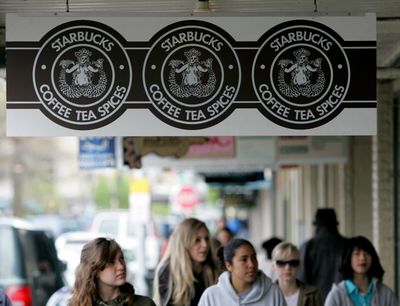Discontent brewing among some Starbucks landlords
Lawsuits claim Seattle-based coffee giant is behind on rents, trying to break leases

As Starbucks Corp. switches its growth plans to decaf, landlords are experiencing withdrawal.
A handful of property owners and developers have filed lawsuits alleging that the Seattle coffee giant owes them money for rent or other expenses on properties where the company has shut down a store or decided not to open one after entering a lease. At least seven lawsuits have been filed against Starbucks since last year, but the anger isn’t limited just to litigants.
Starbucks, which is facing slow sales and weak earnings growth as customers cut back on lattes and Frappuccinos, intends to shut down more than 600 U.S. locations by early next year as part of a broader plan to revive the company. That includes one store in Spokane, at Market and Garland streets.
The lease battles represent a turnabout for Starbucks, which has been one of the most sought-after retail tenants of the past decade. The chain helped draw other retailers to shopping centers and spent top dollar to get the best real estate during its rapid U.S. expansion.
Some landlords contend Starbucks is paying rent late or darkening stores before specifying the closure dates to make the landlords wary of a fight and to pressure them into letting the company out of leases for a price they deem too low.
Starbucks says that, in general, it is in compliance with its lease obligations and not aware of locations where it is behind on rent. The company isn’t necessarily obligated to pay rent for sites it no longer plans to open. In court responses, Starbucks has denied many of the allegations in the lawsuits. In some cases, Starbucks has contended that the landlord didn’t uphold its responsibility or that the lease gives the company the right to terminate it.
“We’re not doing anything out of the norm of any other company that would seek to restructure its real-estate portfolio,” says Michael Malanga, Starbucks senior vice president, U.S. store development. “Our No. 1 objective is to maximize shareholder value.”
The company said most leases have some language that allows it to negotiate out of them. However, landlords in general and liquidation professionals, based on their background knowledge, say there is no clear-cut way for the company to exit from all these leases. The company said some landlords have been unwilling to negotiate and that some of the matters may need to be settled in court.
Starbucks hasn’t disclosed how many leases it has signed for locations it no longer wants to open. Malanga said it “is not a material number.” He said he is pleased with the results of the lease negotiations so far and that the company is “striving for a win-win resolution.”
The company in July said it planned to spend $120 million to $140 million through early next year on lease terminations.
Landlords say they aren’t eager to let Starbucks out of leases. In many cases, the high rent Starbucks agreed to, the customized nature of the building and the deteriorating conditions of the commercial-real-estate market mean that replacement tenants won’t be willing to pay nearly as much rent.
“They talked about us being partners,” said John Caldwell, a real-estate developer who owns and custom-built three properties for Starbucks in Arkansas and Tennessee that the company plans to close. “Now it seems they’ve forgotten their mantra.”
The landlord of a Baton Rouge, La., Starbucks that the company shut down in July has filed a lawsuit against Starbucks in a Louisiana district court accusing it of failing to pay rent since it shuttered the store, putting the company in default on the lease. The lawsuit claims the plaintiff, 6556 Siegen Lane LLC, notified Starbucks in August that the rent for that month was due and that the company was in violation of its lease. Starbucks’ Malanga said the company doesn’t comment on pending litigation, and Starbucks hasn’t yet filed a response.
Another property owner in Louisiana, Twist Realty LP, has filed a lawsuit in Louisiana district court alleging that Starbucks is in default on the lease for a Sterlington, La., building. Twist made the building available in April, but Starbucks informed the owner that it no longer wanted to open a location there, according to Randy Twist, president of Twist Realty. The lawsuit contends that, based on the lease, the first month’s rent was due in June, but Starbucks hasn’t made any payments. In a response filed with the court, Starbucks denied the allegations.
Twist said he has repeatedly tried to contact members of Starbucks’ development department but that his best contacts there were laid off as Starbucks retrenched. “They’re just ignoring their obligations,” Twist said.
Steve Rudd helped develop about 50 locations for Starbucks in several southeastern states starting in 1999. This year, the company told him it won’t be opening at two locations where he had custom-built stores for the company – leaving his firm out of millions of dollars it spent on the sites. In one case, a company Starbucks hired to liquidate some leases offered him one year’s worth of rent to close out the 10-year lease, Rudd said. He declined because he felt it wasn’t enough money.
Rudd said Starbucks since May has failed to pay its rent when it is due on the first of the month at some of his other Starbucks properties, which include cafes in Tennessee and Florida, prompting him to send a default warning overnight and asking for the rent within 10 days.
“What they’re trying to do is to squeeze us,” Rudd contends.
Starbucks declined to discuss Rudd’s allegations. Malanga said there “could be any number of reasons why rent could be late” and that if Starbucks is behind, “we take care of that immediately.”